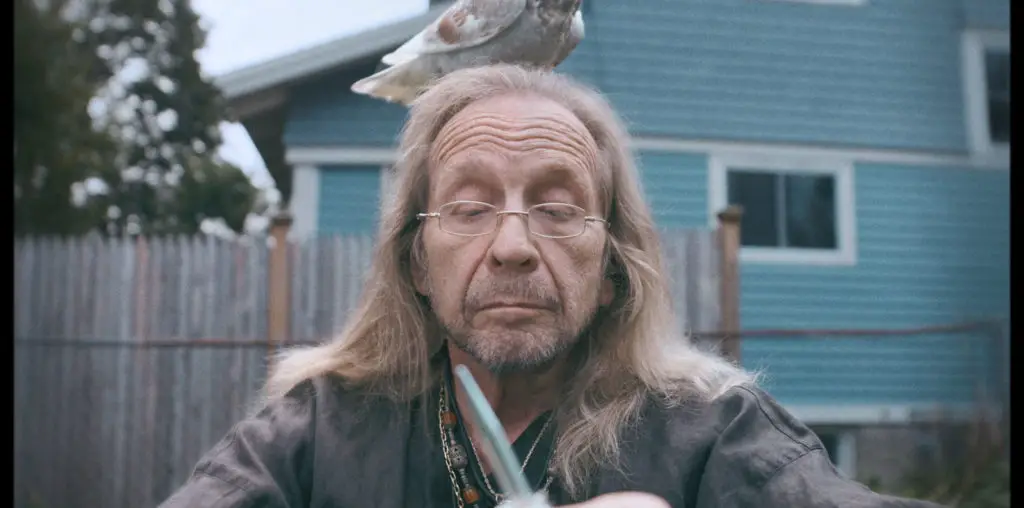
Making Brandon Lee into an action star was like putting a square into a round hole. To be sure, the late Brandon Lee had charisma, but it was nothing like his father’s. No, Brandon Lee seemed much more like the soft, romantic type. As a fighter, not a lover, his fight scenes were competent but unremarkable. But more in his eyes, Brandon Lee lacked the driving, riveting charisma that made his father a legend. In his previous star vehicle, the graceless action film “Showdown in Little Tokyo,” Lee had a rather thankless role as Dolph Lundgren’s sidekick. His performance was very awkward.
In “Rapid Fire,” Lee at least shows some progress in his screen technique, but how difficult must it have been for him, the son of Bruce Lee, to just be comfortable inside his own skin? In a way, Lee could’ve been the son of James Dean. Both Dean and Bruce Lee created original works, and then inspired countless imitations upon their death. This is what Brandon Lee was up against.
In “Rapid Fire,” Director Dwight Little films the same tired action story we saw in his previous effort, “Marked for Death,” which itself was redeemed only by the charisma and eastern mysticism of its star, Steven Seagal. Seagal’s also a great screen fighter: Lee’s not in that class, but then, this was his indoctrination.
The plot of “Rapid Fire” is old, old, old — a variation of the same basket, with a different color weave, or action philosophy, if you will. Lee plays an innocent art student in Chicago who just happened to witness the massacre in Beijing, as well as being an accomplished martial artist on his own. When he witnesses bad guy Nick Mancuso, a ruthless drug dealer, kill someone during a Chinese fundraiser, Lee, the sheltered witness, becomes the target of a firestorm.
The plot for “Rapid Fire” sounds rehashed and tired, until you realize that director Little is just draping it over the film’s real business: the endless shootouts. For Lee, Little seems much more scrutinizing. Lee’s not given much to do in the film, and when he talks he seems awkward, yes, but more uncomfortable inside the boxed nature of the plot. This extends to the unconvincing romance Lee has with Kate Hodge’s character, a cop who rescues Lee after his witness protection hideout is blown to bits. Lee’s best scene in the film comes not during a fight, but after he and the cop have spent the night together. There’s a funny little moment about what happens to clothes after a one-night stand, but we immediately cut away to the tired plot. I’m sick and tired of these kinds of autopilot action plots that are recycled from a database of other action movies. I’m tired of villains, like the ones in “Rapid Fire” who talk endlessly instead of killing, and I’m tired of endings when all of the characters are rounded up like cattle in one place to be killed or saved at random because the filmmakers are so bankrupt, they write themselves into corners.
Then the movie ends. Not the actual ending, but the first one. That’s right: the first group of bad guys gets killed off, at about the sixty minute mark, then it feels like the movie’s going to end, but no, the movie grafts a secondary action plot onto itself to pad out its length. “Rapid Fire” has to be the first studio action film in history where audience members will look at their watches in disbelief and be right. The way “Rapid Fire” is structured, it logically should end after about fifty minutes. I think the editors of “Rapid Fire” probably jumped through more hoops in this movie then the legions of stuntmen.
As for Lee: it’s impossible to conclude if he would’ve become an important actor. A star, yes. Lee demonstrated an effective presence in “The Crow,” which aside from its doomed pedigree was a splendid technical exercise. It also gave Lee the chance to reveal the pain and sensitivity that this obviously deep feeling young actor possessed. This was his greatest strength. Sadly, we’ll never know more.
“Rapid Fire,” is not a good movie, but of course, it also doesn’t have the poignancy of “The Crow,” imbedded in its fabric. Every frame Lee appears in in “The Crow” acts like a creepy memento of a life tragically cut short. Here’s a nice, sensitive young man who died way too soon. I’m afraid the only purpose a film like “Rapid Fire” serves is a means to an end.
